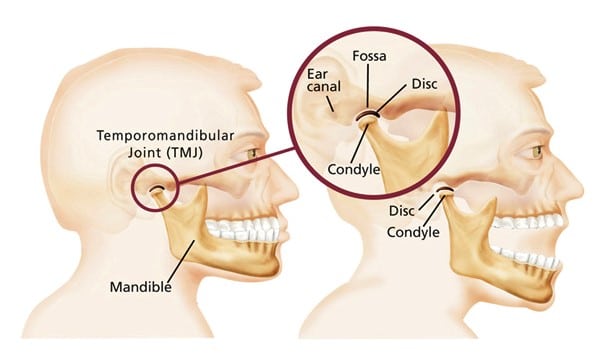TMJ disorder: Do you experience pain or discomfort in your jaw when chewing or talking? Perhaps you’ve noticed clicking or popping sounds when you open and close your mouth. These could be signs of a temporomandibular joint (TMJ) disorder.
What is TMJ?
Temporomandibular joint (TMJ) disorder is a common condition that affects millions of people worldwide. The joint is located in front of the ear on each side of the head, and it allows you to open and close your mouth, chew, and speak. TMJ disorder can occur when the joint becomes inflamed, damaged, or misaligned, leading to a range of uncomfortable symptoms. These symptoms can vary from mild to severe and may include pain or discomfort in the jaw, face, or neck, difficulty chewing or talking, clicking or popping sounds when opening or closing the mouth, headaches, and ear pain or ringing and other symptoms which we’ll be discussing thoroughly in this blog.

The 5 Major Symptoms of TMJ That You Shouldn’t Ignore
Pain in the jaw is one of the most common symptoms of TMJ disorder, but it is often accompanied by a variety of other symptoms. Here are some additional details on the other symptoms mentioned:
- Clicking or Popping Sounds: When the temporomandibular joint is not functioning properly, it can produce clicking or popping sounds when you open and close your mouth. This is because the jawbone is not moving smoothly within the joint, and it can rub against the disc that cushions it. These sounds can be audible to others, and they can sometimes be accompanied by a sensation of the jaw locking or catching.
- Difficulty Chewing or Talking: TMJ disorder can make it difficult to move your jaw properly, which can affect your ability to chew and talk. You may experience a clicking or locking sensation when trying to open or close your mouth fully. You may also have difficulty opening your mouth wide enough to eat certain foods or brush your teeth.
- Headaches: Tension headaches are a common symptom of TMJ disorder. These headaches are usually located in the temples or behind the eyes and can be mild to severe. They can last for several hours or even days and may be accompanied by other symptoms such as dizziness, nausea, or sensitivity to light.
- Ear Pain or Ringing: Because the temporomandibular joint is located near the ear, TMJ disorder can cause ear pain or ringing. You may feel a sensation of fullness in the ear or experience a sharp, stabbing pain. Tinnitus, which is a ringing or buzzing sound in the ear, is also a common symptom of TMJ disorder.
If you are experiencing any of these symptoms, it is important to seek an evaluation from a qualified healthcare provider. They can help diagnose the condition and develop a personalized treatment plan to manage your symptoms and improve your jaw function. With proper treatment, you can alleviate the discomfort and pain associated with TMJ disorder and improve your quality of life.
Why You Shouldn’t Ignore These Symptoms
If left untreated, TMJ disorder can lead to more severe symptoms, such as chronic pain and difficulty opening and closing your mouth. In some cases, TMJ disorder can also cause arthritis and damage to the joint. Ignoring the symptoms of TMJ disorder can have serious consequences on your oral health and overall well-being. Here are some additional details on why you should not ignore these symptoms:
- Chronic Pain: TMJ disorder can cause chronic pain that affects your daily life. If left untreated, the pain can become more severe and constant, making it difficult to eat, talk, and even sleep. Chronic pain can also lead to mood changes, anxiety, and depression, affecting your mental health.
- Difficulty Opening and Closing Your Mouth: TMJ disorder can cause stiffness and limited range of motion in your jaw. Over time, this can lead to difficulty opening and closing your mouth, making it difficult to eat or speak. This can have a significant impact on your daily life, making it hard to perform basic tasks like brushing your teeth or taking medication.
- Arthritis and Joint Damage: TMJ disorder can cause arthritis and damage to the joint if left untreated. This can lead to further pain and discomfort in the jaw, face, and neck, and may require more invasive treatments such as surgery.
- In addition to the physical consequences, ignoring the symptoms of TMJ disorder can also lead to financial burdens. Untreated TMJ disorder can result in missed work or school, and costly dental or medical procedures.
It’s important to seek medical attention as soon as you experience any symptoms of TMJ disorder. Early diagnosis and treatment can prevent the condition from worsening and alleviate your symptoms, improving your quality of life. Your healthcare provider can recommend a personalized treatment plan that may include physical therapy, medication, or in severe cases, surgery.
5 Causes of TMJ Disorders: Understanding the Risk Factors
TMJ disorders are complex conditions that can have multiple causes. Understanding the risk factors that contribute to TMJ disorders can help you take steps to prevent or manage the condition. Here are five common causes of TMJ disorders:
- Teeth Grinding and Clenching: Teeth grinding, also known as bruxism, and clenching the jaw can place excessive pressure on the temporomandibular joint, leading to inflammation and pain. Chronic bruxism can also cause tooth damage and jaw muscle fatigue, worsening TMJ symptoms.
- Jaw Injury or Trauma: Injury or trauma to the jaw, such as a blow to the face or whiplash, can damage the temporomandibular joint and surrounding muscles, leading to TMJ disorders.
- Arthritis: Arthritis, an inflammatory condition that affects the joints, can also affect the temporomandibular joint, causing pain, stiffness, and difficulty with jaw movement.
- Stress: Stress can cause muscle tension in the jaw, leading to TMJ disorders. People who experience high levels of stress may unconsciously clench their jaw or grind their teeth, putting pressure on the temporomandibular joint.
- Poor Posture: Poor postures, such as hunching over a desk or computer, can lead to neck and shoulder tension, which can radiate to the jaw and cause TMJ disorders.
Other risk factors for TMJ disorders include age, gender, and genetics. Women are more likely than men to develop TMJ disorders, and the condition is more common in people between the ages of 20 and 40. Additionally, certain genetic factors may make some individuals more susceptible to TMJ disorders.
Treatment and Management
If you are experiencing any of the symptoms listed above, it is essential to see a dentist or doctor for an evaluation. Treatment for TMJ disorder may include pain relief medication, physical therapy, or the use of a nightguard to prevent grinding and clenching.
In addition to the measures mentioned above, there are other treatment and management options available for TMJ disorder. Your healthcare provider will recommend a personalized treatment plan based on the severity of your condition and your overall health.
Here are some common treatment and management options for TMJ disorder:
- Lifestyle Changes: Certain lifestyle changes can help alleviate symptoms of TMJ disorder. This may include eating soft foods, avoiding hard or chewy foods, practicing stress-reducing techniques, and improving your posture.
- Physical Therapy: Physical therapy exercises can help improve the range of motion in your jaw and reduce pain and discomfort. Your physical therapist may recommend jaw exercises, massages, or stretches.
- Medications: Pain relief medications, such as nonsteroidal anti-inflammatory drugs (NSAIDs) or muscle relaxants, can help alleviate pain and inflammation associated with TMJ disorder. Your healthcare provider may also recommend a low-dose antidepressant to help manage chronic pain.
- Nightguards: If you grind or clench your teeth, wearing a nightguard while you sleep can help alleviate pressure on your jaw and prevent further damage.
- Dental Procedures: In some cases, dental procedures may be necessary to alleviate symptoms of TMJ disorder. This may include orthodontic treatment, dental crowns, or bite adjustment.
- Surgery: In severe cases, surgery may be necessary to alleviate symptoms of TMJ disorder. This may include arthroscopy to remove damaged tissue or joint replacement surgery.
It’s important to work closely with your healthcare provider to develop a treatment plan that is tailored to your individual needs. With proper treatment and management, most people with TMJ disorder can find relief from their symptoms and improve their quality of life.
Where To Find The Best Orthodontic Treatment Near Me?
Looking for the best orthodontic near you? Look no further than Dr. Azita Abbasi! With years of experience and a commitment to personalized care, Dr. Abbasi provides all the necessary treatment options to help you achieve a healthy, beautiful smile. Plus, she offers financial plans to make treatment more affordable, including discounts and free consultations.
Top Orthodontics: Our Commitment to Using the Latest Technology
At Dr. Azita Abbasi’s office, we pride ourselves on using the latest technology to provide the highest quality care to our patients. Our commitment to using top-notch technology means you can trust us to provide the most accurate and efficient treatments possible.
Here are just a few examples of the advanced technologies we use at our office:
- iCat 3-D Dental Imaging: Our state-of-the-art iCat 3-D Dental Imaging system provides incredibly detailed images of your teeth and jaw. This technology allows us to create a precise treatment plan tailored to your unique needs.
- Invisalign: Dr. Abbasi is a certified Invisalign provider, meaning we can help you achieve a straighter smile without the need for traditional braces. Invisalign uses clear aligners that are nearly invisible, making them a popular choice for adults and teens.
- MSE: The MSE (Maxillary Skeletal Expander) appliance is a small device that is custom-fitted to your mouth and attaches to your upper molars. Over time, the device applies gentle pressure to the upper jaw, encouraging the bones to expand and create more space for your teeth. This process can improve your bite and help correct issues such as overbites, underbites, and crossbites.
At Dr. Abbasi’s office, we are committed to providing you with the best possible care. That’s why we offer free consultations and interest-free installment plans to help make treatment more affordable. So why wait? Schedule your appointment today and start your journey to a healthier, more beautiful smile! Visit our website to learn more and schedule your appointment.
Conclusion:
In summary, TMJ disorder is a common condition that can lead to pain, discomfort, and other symptoms in the jaw, neck, and face. It is crucial to seek medical attention if you experience any of the symptoms mentioned in this blog to prevent further complications. Remember, early diagnosis and treatment can help manage the condition and improve your overall quality of life. So, don’t hesitate to reach out to your dentist or doctor for a consultation and take the first step towards managing your TMJ disorder.


